- Home
- Rick Yancey
The Last Star
The Last Star Read online
ALSO BY RICK YANCEY
The 5th Wave
The Infinite Sea
G. P. PUTNAM’S SONS
an imprint of Penguin Random House LLC
375 Hudson Street, New York, NY 10014
Copyright © 2016 by Rick Yancey.
Penguin supports copyright. Copyright fuels creativity, encourages diverse voices, promotes free speech, and creates a vibrant culture. Thank you for buying an authorized edition of this book and for complying with copyright laws by not reproducing, scanning, or distributing any part of it in any form without permission. You are supporting writers and allowing Penguin to continue to publish books for every reader.
G. P. Putnam’s Sons is a registered trademark of Penguin Random House LLC.
Library of Congress Cataloging-in-Publication Data is available upon request.
eBook ISBN 978-1-101-59904-4
Cassiopeia photo copyright © iStockphoto.com/Manfred_Konrad.
This is a work of fiction. Names, characters, places, and incidents either are the product of the author’s imagination or are used fictitiously, and any resemblance to actual persons, living or dead, businesses, companies, events, or locales is entirely coincidental.
Cover design by Allied Integrated Marketing
Version_1
For Sandy
“The world ends. The world begins again.”
Contents
Also by Rick Yancey
Title Page
Copyright
Dedication
Epigraph
THE GIRL WHO COULD FLY
Chapter 1: “I WILL SIT WITH YOU”
Chapter 2
Chapter 3: RINGER
Chapter 4
Chapter 5
I: THE FIRST DAY
Chapter 6: CASSIE
Chapter 7
Chapter 8: ZOMBIE
Chapter 9
Chapter 10: RINGER
Chapter 11
Chapter 12
Chapter 13: SAM
II: THE SECOND DAY
Chapter 14: ZOMBIE
Chapter 15
Chapter 16
Chapter 17
Chapter 18
Chapter 19
Chapter 20
Chapter 21: CASSIE
Chapter 22
Chapter 23: RINGER
Chapter 24
Chapter 25
Chapter 26: ZOMBIE
Chapter 27
Chapter 28
Chapter 29: RINGER
Chapter 30
Chapter 31
Chapter 32
Chapter 33
Chapter 34
III: THE THIRD DAY
Chapter 35: ZOMBIE
Chapter 36
Chapter 37: SAM
Chapter 38
Chapter 39: RINGER
Chapter 40: EVAN WALKER
Chapter 41
Chapter 42
Chapter 43
Chapter 44: SQUAD ONE-NINE
Chapter 45: RINGER
Chapter 46: CASSIE
Chapter 47
Chapter 48
Chapter 49
Chapter 50
Chapter 51
Chapter 52: ZOMBIE
Chapter 53
Chapter 54: CASSIE
Chapter 55
Chapter 56: RINGER
Chapter 57
Chapter 58
Chapter 59: CASSIE
Chapter 60: RINGER
Chapter 61
Chapter 62
IV: THE LAST DAY
Chapter 63: EVAN WALKER
Chapter 64
Chapter 65
Chapter 66
Chapter 67
Chapter 68
Chapter 69
Chapter 70: CASSIE
Chapter 71
Chapter 72: ZOMBIE
Chapter 73
Chapter 74
Chapter 75
Chapter 76
Chapter 77
Chapter 78
Chapter 79
Chapter 80: CASSIE
Chapter 81
Chapter 82
Chapter 83
Chapter 84: SILENCER
Chapter 85: ZOMBIE
Chapter 86
Chapter 87
Chapter 88: RINGER
Chapter 89
Chapter 90
Chapter 91
Chapter 92
Chapter 93
Chapter 94
Chapter 95: SILENCER
Chapter 96: RINGER
Chapter 97
Chapter 98: THE SEVEN BILLION BILLION
MARBLE FALLS
Let no one despair,
even though in the darkest night
the last star of hope may disappear.
—Christoph Martin Wieland
THE GIRL WHO COULD FLY
MANY YEARS AGO, when he was ten, her father had ridden a big yellow bus to the planetarium.
There the ceiling above him exploded into a million glimmering shards of light. His mouth dropped open. His small fingers clamped down on the edge of the wooden bench upon which he sat. Over his head, pinpricks of white fire spun, pure as the day the Earth emerged as a blackened, pockmarked rock, an average planet orbiting an average star at the edge of an average galaxy in a limitless universe.
The Big Dipper. Orion. Ursa Major. The droning monotone of the astronomer’s voice. The children’s faces lifted up, open mouths, unblinking eyes. And the boy feeling infinitesimally small beneath the immensity of that artificial sky.
He would not forget that day.
Years later, when his daughter was very young, she would run to him, pudgy toddler legs wobbling, solid little arms lifted up, eyes burning with anticipation and joy, crying, Daddy, Daddy, stubby fingers spread wide, reaching for him, reaching for the sky.
And she would leap, a fearless launch into empty space, because he wasn’t just her father—he was Daddy. He would catch her; he would not let her fall.
Crying: Fly, Daddy, fly!
And up she would go, rocketing toward the immensity of the unbounded sky, arms open to embrace the infinite, her head thrown back, rushing to that place where terror and wonder meet, her squeals the distilled hilarity of being weightless and free, of being safe in his arms, of being alive.
Cassiopeia.
From that day at the planetarium, when her life lay fifteen years in the future, there was no doubt what name he would give her.
1
“I WILL SIT WITH YOU”
THIS IS MY BODY.
In the cave’s lowermost chamber, the priest raises the last wafer—his supply has been exhausted—toward the formations that remind him of a dragon’s mouth frozen in mid-roar, the growths like teeth glistening red and yellow in the lamplight.
The catastrophe of the divine sacrifice by his hands.
Take this, all of you, and eat of it . . .
Then the chalice containing the final drops of wine.
Take this, all of you, and drink from it . . .
Midnight in late November. In the caves below, the small band of survivors will remain warm and hidden with enough supplies to last until spring. No one has died of the plague in months. The worst appears to be over. They are safe here, perfectly safe.
With faith in your love and mercy, I
eat your body and drink your blood . . .
His whispers echo in the deep. They clamber up the slick walls, skitter along the narrow passage toward the upper chambers, where his fellow refugees have fallen into a restless sleep.
Let it not bring me condemnation, but health in mind and body.
There is no more bread, no more wine. This is his final Communion.
May the body of Christ bring me to everlasting life.
The stale fragment of bread that softens on his tongue.
May the blood of Christ bring me to everlasting life.
The drops of soured wine that burn his throat.
God in his mouth. God in his empty stomach.
The priest weeps.
He pours a few drops of water into the chalice. His hand shakes. He drinks the precious blood commingled with water, then wipes clean the chalice with the purificator.
It is finished. The everlasting sacrifice is over. He dabs his cheeks on the same cloth he used to clean the chalice. The tears of man and the blood of God inseparable. Nothing new in that.
He wipes clean the paten with the cloth, then stuffs the purificator into the chalice and sets it aside. He pulls the green stole from his neck, folds it carefully, kisses it. He loved everything about being a priest. Loved the Mass most of all.
His collar is damp with sweat and tears and loose about his neck: He’s lost fifteen pounds since the plague struck, and abandoned his parish to make the hundred-mile journey to the caverns north of Urbana. Along the way he gained many followers—over fifty in all, though thirty-two died from the infection before reaching safety. As their deaths approached, he spoke the rite, Catholic, Protestant, or Jew, it didn’t matter: May the Lord in his love and mercy help you . . . Tracing a cross on their hot foreheads with his thumb. May the Lord who frees you from sin save you . . .
The blood that seeped from their eyes mixed with the oil he rubbed on their lids. And smoke rolled across open fields and hunkered in woods and capped over roads like ice over languid rivers in deep winter. Fires in Columbus. Fires in Springfield and Dayton. In Huber Heights and London and Fairborn. In Franklin and Middletown and Xenia. In the evenings the light from a thousand fires turned the smoke a dusky orange, and the sky sank to an inch above their heads. The priest shuffled through the smoldering landscape with one hand outstretched, pressing a rag over his nose and mouth with the other while tears of protest streamed down his face. Blood crusted beneath his broken nails, blood caked in the lines of his hands and in the soles of his shoes. Not much farther, he encouraged his companions. Keep moving. Along the way, someone nicknamed him Father Moses, for he was leading his people out of the obscurity of smoke and fire to the Promised Land of “Ohio’s Most Colorful Caverns!”
People were there, of course, to greet them when they arrived. The priest expected it. A cave does not burn. It is impervious to weather. Best of all, it’s easy to defend. After military bases and government buildings, caves were the most popular destinations in the aftermath of the Arrival.
Supplies had been gathered, water and nonperishables, blankets and bandages and medicines. And weapons, naturally, rifles and pistols and shotguns and many knives. The sick were quarantined in the welcome center aboveground, lying in cots arranged between the display shelves of the gift shop, and every day the priest visited them, spoke with them, prayed with them, heard their confessions, delivered Communion, whispered the things they wanted to hear: Per sacrosancta humanae reparationis mysteria . . . By the sacred mysteries of man’s redemption . . .
Hundreds would die before the dying was over. They dug a pit ten feet wide and thirty feet deep to the south of the welcome center to burn them. The fire smoldered day and night, and the smell of burning flesh had become so commonplace, they hardly noticed.
Now it’s November, and in the lowermost chamber the priest rises. He is not tall; still, he must stoop to avoid smacking his head into the ceiling or against the stone teeth that bristle from the roof of the dragon’s mouth.
The Mass is ended, go in peace.
He leaves behind the chalice and the purificator, the paten and his stole. They are relics now, artifacts from an age receding into the past at the speed of light. We began as cave dwellers, the priest thinks as he makes his way toward the surface, and to caves we have returned.
Even the longest journey is a circle, and history will always cycle back to the place where it began. From the missal: “Remember you are dust and unto dust you shall return.”
And the priest rises like a diver kicking toward the dome of the sky sparkling above the water.
Along the narrow passageway that winds gently upward between walls of weeping stone, the floor is as smooth as the lanes of a bowling alley. Only a few months before, schoolchildren on field trips marched in single file, trailing their fingers along the rock face, their eyes searching for monsters in the shadows that pooled in the crevices. They were still young enough to believe in monsters.
And the priest rising like a leviathan from the lightless deep.
The trail to the surface runs past the Caveman’s Couch and the Crystal King, into the Big Room, the main living area for the refugees, and finally into the Palace of the Gods, his favorite part of the caverns, where crystalline formations shine like frozen shards of moonlight and the ceiling sensually undulates like waves rolling in to shore. Here, close to the surface, the air thins, becomes drier, tinged with the smoke of the fires that still feed upon the world they left behind.
Lord, bless these ashes by which we show that we are dust.
Snatches of prayer run through his mind. Fragments of song. Litanies and blessings and the words of absolution, May God give you pardon and peace, and I absolve you from your sins . . . And from the Bible: “I went down to the roots of the mountains; to the land whose bars closed behind me forever.”
Incense burning in the censer. Soft spring sunlight shattered by stained glass. The creaking of the pews on Sunday like the hull of an ancient vessel far at sea. The stately measure of the seasons, the calendar that governed his life from the time he was an infant, Advent, Christmas, Lent, Easter. He knows he loved the wrong things, the rituals and traditions, the pomp and foppery for which outsiders faulted the Church. He adored the form, not the substance; the bread, not the body.
It didn’t make him a bad priest. He was quiet and humble and faithful to his calling. He enjoyed helping people. These weeks in the cave had been some of the most fulfilling of his life. Suffering brings God to his natural home, the manger of terror and confusion, pain and loss, where he was born. Turn over the currency of suffering, the priest thinks, and you will see his face.
A watchman sits just inside the opening above the Palace of the Gods, his burly frame silhouetted against the spray of stars beyond him. The sky has been scrubbed clean by a stiff north wind auguring winter. The man wears a baseball cap pulled low over his forehead, and a worn leather jacket. He’s holding a pair of binoculars. A rifle rests in his lap.
The man nods a hello to the priest. “Where’s your coat, Father? It’s a cold one tonight.”
The priest smiles wanly. “I lent it to Agatha, I’m afraid.”
The man grunts his understanding. Agatha is the complainer of the group. Always cold. Always hungry. Always something. He lifts the binoculars to his eyes and scans the sky.
“Have you seen any more of them?” the priest asks. They spotted the first grayish-silver, cigar-shaped object a week before, hanging motionlessly above the caverns for several minutes before silently shooting straight up, dwindling to a pinprick scar in the vast blue. Another—or the same one—appeared two days later, gliding soundlessly over them until it dropped beneath the horizon. There was no question about the origin of these strange craft—the cave dwellers knew they weren’t terrestrial—it was the mystery of their purpose that frightened them.
The man lowers the binoculars and
rubs his eyes. “What’s the matter, Father? Can’t sleep?”
“Oh, I don’t sleep much these days,” the priest says. Then he adds, “So much to do.” He doesn’t want the man to think he’s complaining.
“No atheists in foxholes.” The cliché hangs in the air like a rancid smell.
“Or in caves,” the priest says. Since they met, he has strained to know this man better, but he is a closed room, the door securely dead-bolted by anger and grief and the hopeless dread of the doomed living on borrowed time. For months there’s been no turning from it or hiding from it. For some, death is the midwife to faith. For others, it is faith’s executioner.
The man pulls a pack of gum from his breast pocket, carefully unwraps a piece, and folds it into his mouth. He counts the remaining sticks before slipping the pack back into his pocket. He does not offer any to the priest.
“My last pack,” the man says in explanation. He shifts his weight on the cold stone.
“I understand,” the priest says.
“Do you?” The man’s jaw moves with a hypnotic rhythm as he chews. “Do you really?”
The dry bread, the soured wine: The taste lingers on his tongue. The bread could have been broken; the wine could have been divided. He did not have to celebrate the Mass alone. “I believe that I do,” the little priest answers.
“I don’t,” the man says slowly and deliberately. “I don’t believe in a goddamned thing.”
The priest blushes. His soft, embarrassed laughter is like the patter of children’s feet up a long staircase. He touches his collar nervously.
“When the power died, I believed it would come back on,” the man with the rifle says. “Everybody did. The power goes out—the power comes back on. That’s faith, right?” He gnawed the gum, left side, right side, pushing the green knob back and forth with his tongue. “Then the news trickles in from the coasts that there are no coasts anymore. Now Reno is prime oceanfront property. Big deal; so what? There’ve been earthquakes before. There’ve been tsunamis. Who needs New York? What’s so special about California? We’ll bounce back. We always bounce back. I believed that.”
The watchman is nodding, staring at the night sky, at the cold, blazing stars. Eyes high, voice low. “Then people got sick. Antibiotics. Quarantines. Disinfectants. We put on masks and washed our hands until our skin peeled off. Most of us died anyway.”

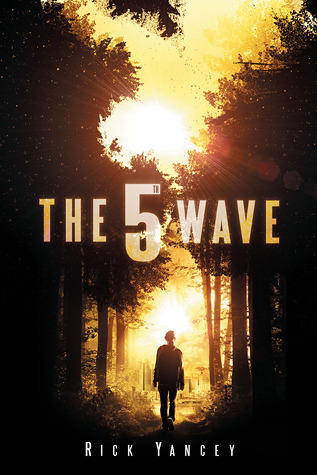 The 5th Wave
The 5th Wave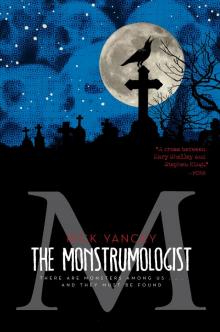 The Monstrumologist
The Monstrumologist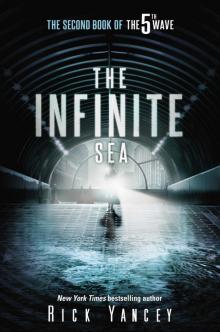 The Infinite Sea
The Infinite Sea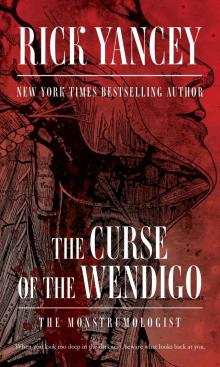 The Curse of the Wendigo
The Curse of the Wendigo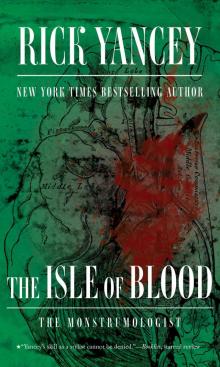 The Isle of Blood
The Isle of Blood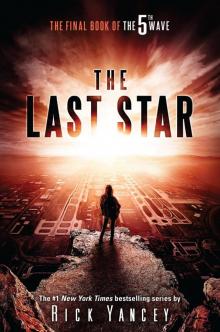 The Last Star
The Last Star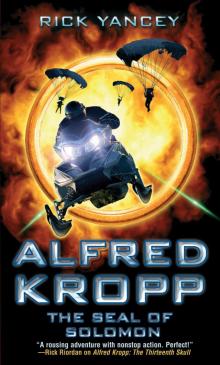 The Seal of Solomon
The Seal of Solomon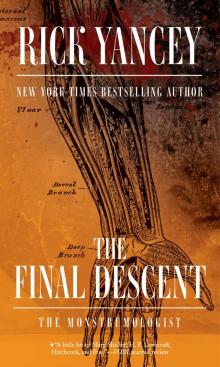 The Final Descent
The Final Descent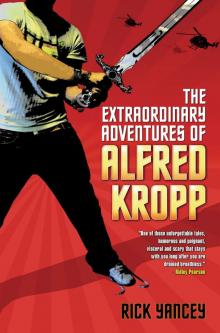 The Extraordinary Adventures of Alfred Kropp
The Extraordinary Adventures of Alfred Kropp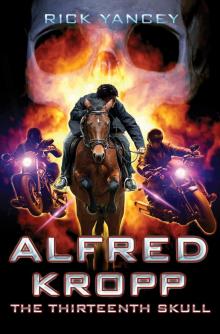 The Thirteenth Skull
The Thirteenth Skull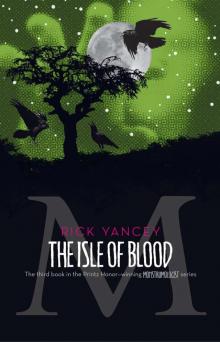 The Isle of Blood (Monstrumologist)
The Isle of Blood (Monstrumologist)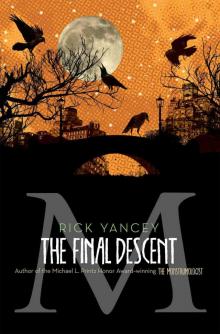 The Final Descent (The Monstrumologist)
The Final Descent (The Monstrumologist)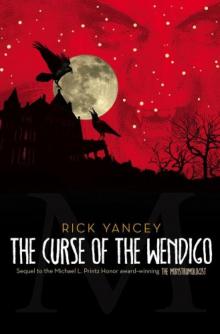 The Curse of the Wendigo (The Monstrumologist, Book 2)
The Curse of the Wendigo (The Monstrumologist, Book 2)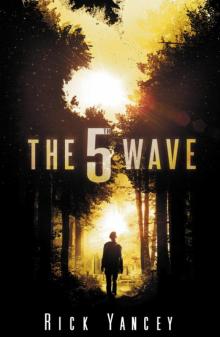 The 5th Wave t5w-1
The 5th Wave t5w-1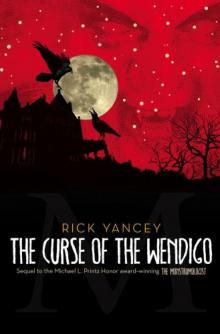 The Curse of the Wendigo (The Monstrumologist, Book 2) m-2
The Curse of the Wendigo (The Monstrumologist, Book 2) m-2